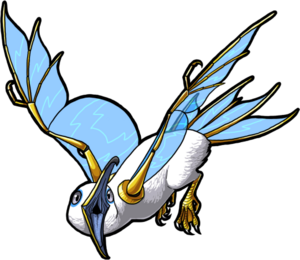Glass-Winged Mew
The Glass-Winged Mew is a Very Common creature released on Protochroma. It is found only in Chroma Coast and its associated Regular Delve, Low Tide. Its standard variant is Blue.
Descriptions
Baby
This gold egg has a faintly metallic shell, and semi-translucent patches. You can see a vague silhouette developing inside.
Juvenile
The egg hatched into a fluffy, gangly chick that reminds you of a seagull. Unlike a seagull, though, it has articulated metal wings with flexible glass-like panels for "webbing". It's always hungry, and squawks loudly at you to be fed.
Adult
Based on their resemblance to Earth's seagulls, one might expect the Glass-Winged Mew to be a hardy generalist found along the coast. And this expectation is correct: the noisy squawks of these birds are a near-constant along the shoreline. Glass-Winged Mews primarily skim the surface of the water for any small creatures that swim too far up, and pick at both metallic and biological scraps that wash up along the shore. They live in flocks, and are very sociable creatures that nest in and around cliffs and spend time preening each other.
The biomechanical systems in Glass-Winged Mews are an area of great interest, as their wings and tails grow with the bird, but stay properly proportioned. They appear capable of processing and incorporating scraps of metal and silicate into their bodies as they grow. Researchers are attempting to discover just how these complex systems are integrated into the birds, and speculation about how they became this way runs rampant. Progress is somewhat hindered by the fragility and rapid decay of their systems in dead specimens, and the constant annoying squawking from live ones.
Additional Lore
- Mews are natural enemies of Vitreverns, and it isn't uncommon to see groups of the two fighting because a Vitrevern was attracted to the shiny metal parts of a Mew.
Delving
Low Tide
| Image | HP | Spawn Conditions | Additional Notes |
|---|---|---|---|
 |
50 | Randomly | -- |
 |
55 | Randomly | -- |
 |
55 | Trap: Algae-covered Rock | -- |
Images
| Image Type | Images | ||||||
|---|---|---|---|---|---|---|---|
| Baby |  |
-- | -- | -- | -- | -- | -- |
| Juvenile |  |
-- | -- | -- | -- | -- | -- |
| Common Adult |
 |
 |
 |
 |
 |
 |

|
| Rare Adult |
 |
 |
 |
 |
 |
 |

|


